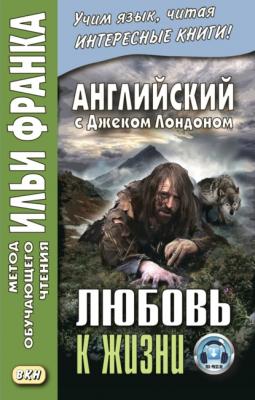Английский с Джеком Лондоном. Любовь к жизни / Jack London. Love of Live. Джек Лондон
Читать онлайн.| Название | Английский с Джеком Лондоном. Любовь к жизни / Jack London. Love of Live |
|---|---|
| Автор произведения | Джек Лондон |
| Жанр | Иностранные языки |
| Серия | Метод обучающего чтения Ильи Франка |
| Издательство | Иностранные языки |
| Год выпуска | 2020 |
| isbn | 978-5-7873-1540-0 |
He unwrapped his pack and the first thing he did was to count his matches. There were sixty-seven. He counted them three times to make sure. He divided them into several portions, wrapping them in oil paper, disposing of one bunch in his empty tobacco pouch, of another bunch in the inside band of his battered hat, of a third bunch under his shirt on the chest. This accomplished, a panic came upon him, and he unwrapped them all and counted them again. There were still sixty-seven.
He dried his wet foot-gear by the fire (он просушил свою мокрую обувь у огня). The moccasins were in soggy shreds (мокасины были промокшими клочьями). The blanket socks were worn through in places (шерстяные носки были изношены насквозь = до дыр в некоторых местах; to wear – носить /одежду, прическу, украшения и т. п./; снашивать/ся/), and his feet were raw and bleeding (а его ступни были ободранными и кровоточащими; raw – сырой, недоваренный; недожаренный /о пище, еде/; ободранный, лишенный кожи, кровоточащий /о ране, коже/). His ankle was throbbing (его лодыжка пульсировала), and he gave it an examination (и он осмотрел ее; to give an examination – делать осмотр, осматривать). It had swollen to the size of his knee (она распухла до размера колена; to swell – набухать, разбухать, опухать). He tore a long strip from one of his two blankets and bound the ankle tightly (он оторвал длинную полоску от одного из своих двух одеял и туго перевязал лодыжку; to tear – рвать, отрывать). He tore other strips and bound them about his feet to serve for both moccasins and socks (он оторвал другие полоски = нарвал еще полосок и перевязал ими ноги, чтобы они /полоски/ служили как мокасинами, так и носками). Then he drank the pot of water, steaming hot (затем он выпил котелок воды, горячей с паром; steam – пар; to steam – выпускать пар; парить, подниматься в виде пара), wound his watch (завел часы; to wind – наматывать/ся/; обматывать/ся/, обвивать/ся/; мотать; заводить /часы/), and crawled between his blankets (и заполз между одеял).
He slept like a dead man (он спал, как мертвый). The brief darkness around midnight came and went (недолгая тьма около полуночи пришла и ушла; brief – короткий, недолгий). The sun arose in the northeast (солнце поднялось на северо-востоке) – at least the day dawned in that quarter (по крайней мере, в этой четверти зарождался день; to dawn – /рас/светать, зачинаться /о рассвете/; начинаться; проявляться; зарождаться), for the sun was hidden by gray clouds (ибо солнце было скрыто серыми тучами; to hide – прятать, скрывать).
He dried his wet foot-gear by the fire. The moccasins were in soggy shreds. The blanket socks were worn through in places, and his feet were raw and bleeding. His ankle was throbbing, and he gave it an examination. It had swollen to the size of his knee. He tore a long strip from one of his two blankets and bound the ankle tightly. He tore other strips and bound them about his feet to serve for both moccasins and socks. Then he drank the pot of water, steaming hot, wound his watch, and crawled between his blankets.
He slept like a dead man. The brief darkness around midnight came and went. The sun arose in the northeast – at least the day dawned in that quarter, for the sun was hidden by gray clouds.
At six o’clock he awoke (в шесть часов он проснулся; to awake – просыпаться, очнуться от сна), quietly lying on his back (неподвижно лежа на спине; quietly – спокойно, тихо, бесшумно; не двигаясь). He gazed straight up into the gray sky (он пристально вгляделся прямо в серое небо) and knew that he was hungry (и понял, что он голоден). As he rolled over on his elbow he was startled by a loud snort (когда он перекатился на локоть, его испугало громкое фырканье), and saw a bull caribou regarding him with alert curiosity (и /он/ увидел самца карибу, разглядывавшего его с настороженным любопытством). The animal was not more than fifty feet away (животное было не более, чем в пятидесяти футах от него; away – прочь, вдали), and instantly into the man’s mind leaped the vision and the savor of a caribou steak sizzling and frying over a fire (и тотчас в уме человека выросло видение и вкус бифштекса из карибу, шипящего и поджаривающегося над костром; savor – особый вкус или запах /чего-либо/; to leap – прыгать, скакать).
